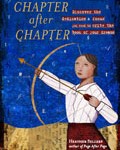Staying on Target: Chapter after Chapter
“Why is that lady shooting a bow and arrow?” my youngest son asked me yesterday, holding my copy of Heather Sellers’ Chapter after Chapter.
“Because she’s aiming for a target,” I told him.
“But where’s the target? I can’t see it.” He turned the book over and looked at me puzzled.
“Well, she’s writing a book. She’s … aiming to finish the book.”
“Oh.”
It’s hard to explain to a four-year-old why writing is like aiming at a target — one we can’t see, one that’s in our heads. But Heather Sellers does a great job in her new book for writers, Chapter after Chapter: Discover the Dedication and Focus You Need to Write the Book of Your Dreams.
I plowed through this book in a couple of nights, holding my breath, hoping at last I would discover the secret that would unlock my inability to complete my novel PROJECT. (Isn’t that a lovely word, tying up all those scattered bits and pieces of plot and character?)
I found it. And here’s what I learned. When you want to write a book, you need to start a program of sorts called the “Book 100.” That is, you need to read 100 books in the genre of book you’d like to write. (She adapted this from the Pilates 100, a basic daily abdominal exercise that builds your strength).
For me, this means if I’m wanting to write a middle grade novel, I need to read 100 middle grade novels — old ones, new ones, classics, award-winners, the hot new things, and ones I’ve never heard of that my kids pick out from the library.
If you’re wanting to write chick-lit, read a bunch of chick-lit novels — skimming if you have to. If you want to write inspirational non-fiction, go crazy at the library — or pick out a few at the bookstore. And read. Not for pleasure.
Read like a writer. Note how the author sets up scenes, creates tension, pulls the plot forward, makes you fall in love with the characters, makes you laugh or cry.
The second thing Sellers says to do is when you’ve gotten through the Book 100, it’s time to quit reading such a variety and FOCUS FOCUS FOCUS on your own writing — so you need to surround yourself with ONLY six books: three books like you’re trying to write and three craft books (on the art of writing).
Then take those six books and study them, underline, highlight, scribble here and there until you OWN the books. You know them inside out. During the months (year?) you’re writing a book, you should only keep these books around.
Sellers writes, “You must severely limit your distractions during your book-writing efforts … you can’t be a wide reader while you’re writing your book. Sure, you may have used the Book 100 as a ramp into your writing, but once you’re there the training wheels have to come off. It’s just too hard to be a recreational reader and a writer at the same time. When you are done with your first full draft, you can go on a reading vacation and catch up on all the books you missed while you were away.”
Hmmm … I’d never considered the fact that my wide reading habit has been keeping my manuscript locked away in my mind. Writers are always told to READ, READ, READ. Now I realize that reading the Book 100 is important, crucial … but there comes a time when the Six Wise Guides must take over.
Sellers continues, “The Six Wise Guides are my pit crew. I focus my writing time like a race car driver doing laps around the track, grooving down tight, and when I get stuck, blow a tire, get off track, the six books in the pit are there for me. They’re watching me the whole time. They run across the pavement with their tools. They want me to succeed. They want me back in the race.”
What do you think about this? Have you made your way through a “Book 100” program of sorts? Do you have Six Wise Guides?
If you’re having trouble staying focused on your manuscript, I highly recommend getting a copy of Sellers’ book (published by Writer’s Digest). She’ll give you the motivation you need to find your target and aim for it.
Even if it’s one you can’t yet see.
